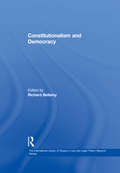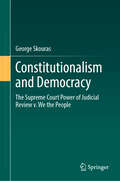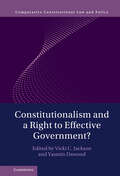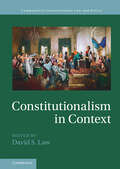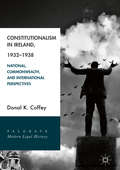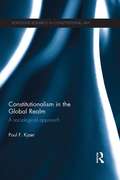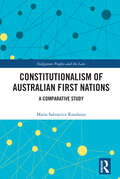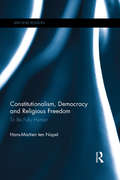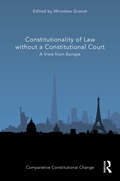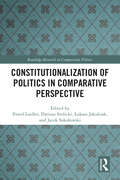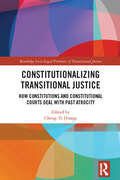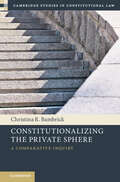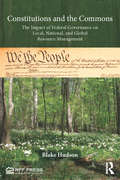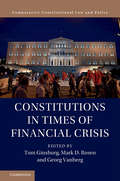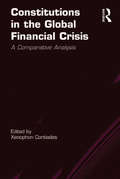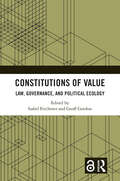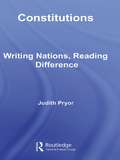- Table View
- List View
Constitutionalism and Democracy: Democracy, Constitutionalism And Citizenship In The Eu (The\international Library Of Essays In Law And Legal Theory (second Series) Ser. #2)
by Richard BellamyConstitutionalism and democracy have been interpreted as both intimately related and intrinsically opposed. On the one hand constitutions are said to set out the rules of the democratic game, on the other as constraining the power of the demos and their representatives to rule themselves - including by reforming the very processes of democracy itself. Meanwhile, constitutionalists themselves differ on how far any constitution derives its authority from, and should itself be subject to democratic endorsement and interpretation. They also dispute whether constitutions should refer solely to democratic processes, or also define and limit democratic goals. Each of these positions produces a different view of judicial review, the content and advisability of a Bill of Rights and the nature of constitutional politics. These differences are not simply academic positions, but are reflected in the different types of constitutional democracy found in the United States, continental Europe, Britain and many commonwealth countries. The selected essays explore these issues from the perspectives of law, philosophy and political science. A detailed and informative introduction sets them in the context of contemporary debates about constitutionalism.
Constitutionalism and Democracy: The Supreme Court Power of Judicial Review v. We the People
by George SkourasThis book explore the power of judicial review as held by the United States Supreme Court. The legal analysis fuses with an exploration of democratic theory, We the People, efforts in contesting this power. It also explores the class status of the American Constitution and the difficulties of amending it through its many protections against making major changes to its structure. The book makes inquires as to whether the document should be preserved as interpreted by Originalists or can be subject to change as interpreted by Progressives---the “Living” Document theorists and the “Dead” Document opponents. It is argued that the power of judicial review must be withdrawn from the Supreme Court and the need for the modernization of the American political institutions. The book’s approach is to use an interdisciplinary methodology by which it weaves a linear and non-linear aspects of inquiry. The book will be of interested to a broad readership, including those working in the fields of (constitutional) law, legal history. political philosophy, political science and political theory.
Constitutionalism and a Right to Effective Government? (Comparative Constitutional Law and Policy)
by Vicki C. Jackson Yasmin DawoodNations around the world are facing various crises of ineffective government. Basic governmental functions—protecting rights, preventing violence, and promoting material well-being—are compromised, leading to declines in general welfare, in the enjoyment of rights, and even in democracy itself. This innovative collection, featuring analyses by leaders in the fields of constitutional law and politics, highlights the essential role of effective government in sustaining democratic constitutionalism. The book explores “effective government” as a right, principle, duty, and interest, situating questions of governance in debates about negative and positive constitutionalism. In addition to providing new conceptual approaches to the connections between rights and governance, the volume also provides novel insights into government institutions, including courts, legislatures, executives, and administrative bodies, as well as the media and political parties. This is an essential volume for anyone interested in constitutionalism, comparative law, governance, democracy, the rule of law, and rights.
Constitutionalism and the Rule of Law
by Maurice Adams Anne Meuwese Ballin Ernst HirschRule of law and constitutionalist ideals are understood by many, if not most, as necessary to create a just political order. Defying the traditional division between normative and positive theoretical approaches, this book explores how political reality on the one hand, and constitutional ideals on the other, mutually inform and influence each other. Seventeen chapters from leading international scholars cover a diverse range of topics and case studies to test the hypothesis that the best normative theories, including those regarding the role of constitutions, constitutionalism and the rule of law, conceive of the ideal and the real as mutually regulating.
Constitutionalism beyond Liberalism
by Michael A. Wilkinson Michael W. DowdleConstitutionalism Beyond Liberalism bridges the gap between comparative constitutional law and constitutional theory. The volume uses the constitutional experience of countries in the global South - China, India, South Africa, Pakistan, Indonesia, and Malaysia - to transcend the liberal conceptions of constitutionalism that currently dominate contemporary comparative constitutional discourse. The alternative conceptions examined include political constitutionalism, societal constitutionalism, state-based (Rousseau-ian) conceptions of constitutionalism, and geopolitical conceptions of constitutionalism. Through these examinations, the volume seeks to expand our appreciation of the human possibilities of constitutionalism, exploring constitutionalism not merely as a restriction on the powers of government, but also as a creating collective political and social possibilities in diverse geographical and historical settings.
Constitutionalism in Asia in the Early Twenty-First Century
by Albert H.Y. ChenExamining developments in the first decade of the twenty-first century, this authoritative collection of essays studies the evolving practice of constitutional law and constitutionalism in Asia. It provides a comprehensive overview of the diverse constitutional issues and developments in sixteen East, Southeast and South Asian countries. It also discusses the types of constitutionalism that exist and the general trends in constitutional developments whilst offering comparative, historical and analytical perspectives on Asian constitutionalism. Written by leading scholars in the field, this book will be of great interest to students and scholars alike.
Constitutionalism in Context (Comparative Constitutional Law and Policy)
by David S. LawWith its emphasis on emerging and cutting-edge debates in the study of comparative constitutional law and politics, its suitability for both research and teaching use, and its distinguished and diverse cast of contributors, this handbook is a must-have for scholars and instructors alike. This versatile volume combines the depth and rigor of a scholarly reference work with features for teaching in law and social science courses. Its interdisciplinary case-study approach provides political and historical as well as legal context: each modular chapter offers an overview of a topic and a jurisdiction, followed by a case study that simultaneously contextualizes both. Its forward-looking and highly diverse selection of topics and jurisdictions fills gaps in the literature on the Global South as well as the West. A timely section on challenges to liberal constitutional democracy addresses pressing concerns about democratic backsliding and illiberal and/or authoritarian regimes.
Constitutionalism in Ireland, 1932–1938: National, Commonwealth, And International Perspectives (Palgrave Modern Legal History Ser.)
by Donal K. CoffeyThe first of two volumes, this book examines constitutionalism in Ireland in the 1930s. Donal K. Coffey places the document and its drafters in the context of a turbulent decade for the United Kingdom, the Commonwealth, and Europe. He considers a series of key issues leading up to its drafting, including the failure of the 1922 Constitution, the rise of nationalism in the 1920s and 1930s, and the abdication of Edward VIII. He sketches the drafting process, examines the roles of individual drafters and their intellectual influences, and considers the Constitution’s public reception, both domestically and internationally. This book illuminates a critical moment in Irish history and the confluence of national, Commonwealth, and international influences that gave rise to it, for scholars of Irish history as well as of legal, constitutional, and Commonwealth history more broadly.
Constitutionalism in the Global Realm: A Sociological Approach (Routledge Research in Constitutional Law)
by Poul F. KjaerThis book develops a sociologically informed theory of constitutionalism in the global realm, addressing both national and transnational forms of constitutional ordering. The book begins with the argument that current approaches to constitutionalism remain tied to a state-based conception of constitutions, and overlooks underlying structural transformations that trigger the emergence of constitutional forms of ordering. Poul F. Kjaer aims to address this shortcoming by offering a sociological and historically informed analysis of the evolution of constitutionalism in the face of globalisation. The analysis contextualises on-going constitutional developments through the use of a long-term historical perspective, which is capable of highlighting the impact of deeper structural transformations unfolding within society. The book looks at the ways in which national and transnational legal forms have evolved alongside one another. It demonstrates that the formation of global constitutions has not resulted in a corresponding decrease in the power of nation states, but instead, legal and political aspects of both the nation state and the transnational have been reconfigured and intensified in a mutually supportive manner. In combining insights from a range of fields, this interdisciplinary book will be of great interest to students and scholars of constitutional law, sociology, global governance studies, and legal, social and political theory.
Constitutionalism of Australian First Nations: A Comparative Study (Indigenous Peoples and the Law)
by Maria Salvatrice RandazzoThe book considers Australian First Nations constitutionalism by drawing on the chthonic constitutional traditions of three distinct Australian First Nations legal orders: the Warlpiri, Yolngu, and Pintupi legal orders, in the endeavour of identifying, via a comparative analysis, a core of similarities to be drawn upon and articulate an emergent legal theory common to the three legal orders. The comparative analysis is undertaken at the most foundational levels of their legal traditions, via the prism of a legal paradigm elaborated with reference to an Australian Indigenous cosmological, ontological, and epistemological standpoint. The proposed legal theory comprises a broad overview, general concepts, normative principles, and general working principles. In so doing, the book expounds how Australian First Nations constitutionalism unfolds into holistic orders of spiritual, political, and legal authority that are explainable in terms of legal theory. At the most foundational level, such elaboration may help delineate normative and legal constitutional patterns throughout Indigenous Australia.
Constitutionalism of the Global South
by Daniel Bonilla MaldonadoThe Indian Supreme Court, the South African Constitutional Court, and the Colombian Constitutional Court have been among the most important and creative courts in the Global South. In Asia, Africa, and Latin America, these courts are widely seen as activist tribunals that have contributed (or attempted to contribute) to the structural transformation of the public and private spheres of their countries. The cases issued by these three courts are gradually creating what can be called a constitutionalism of the Global South. This book addresses in a direct and detailed way the jurisprudence of these three Courts on three key topics: access to justice, cultural diversity, and socioeconomic rights. This volume is a valuable contribution to the discussion about the contours and structure of contemporary constitutionalism. It makes explicit that this discussion has interlocutors both in the Global South and Global North while showing the common discourse between them and the important differences on how they interpret and solve key constitutional problems.
Constitutionalism, Democracy and Religious Freedom: To be Fully Human (Law and Religion)
by Hans-Martien ten NapelIn both Europe and North America it can be argued that the associational and institutional dimensions of the right to freedom of religion or belief are increasingly coming under pressure. This book demonstrates why a more classical understanding of the idea of a liberal democracy can allow for greater respect for the right to freedom of religion or belief. The book examines the major direction in which liberal democracy has developed over the last fifty years and contends that this is not the most legitimate type of liberal democracy for religiously divided societies. Drawing on theoretical developments in the field of transnational constitutionalism, Hans-Martien ten Napel argues that redirecting the concept and practice of liberal democracy toward the more classical notion of limited, constitutional government, with a considerable degree of autonomy for civil society organizations would allow greater religious pluralism. The book shows how, in a postsecular and multicultural context, modern sources of constitutionalism and democracy, supplemented by premodern, transcendental legitimation, continue to provide the best means of legitimating Western constitutional and political orders.
Constitutionality of Law without a Constitutional Court: A View from Europe (Comparative Constitutional Change)
by Mirosław GranatThis book analyses the problem of the possibility of guaranteeing the constitutionality of law in cases when a constitutional court either has been weakened or does not exist. A starting point of the research is the emergence of the so-called illiberal constitutionalism in several states, namely Poland, Hungary and Turkey, as this phenomenon gravely affects the functioning of constitutional courts. The work is divided into three parts. The first contains contributions of a theoretical nature dedicated to the current shape of constitutional review, in particular in the light of the emergence of "illiberal constitutionalism". This part of the book also deals with the collapse of the centralised constitutional review in Poland and the attempts to resolve the constitutional crisis. The second is focused on discussing specific, current problems with constitutional review, on the basis of states such as Hungary, Romania, Turkey and Poland. The third relates to other forms of constitutional review, that is, the so-called dispersed model and the parliamentary one executed in the course of the legislative process. The contributions discuss such forms of constitutional review in the Netherlands and Finland. The book will be a valuable resource for students, academics and policy-makers working in the areas of constitutional law and politics.
Constitutionalization of Politics in Comparative Perspective (Routledge Research in Comparative Politics)
by Paweł Laidler Dariusz Stolicki Łukasz Jakubiak Jacek SokołowskiScholars from political science and law examine the latest research on the constitutionalization of politics in comparative perspective.The scope includes both inter- country and intra- country perspectives, institutional and systemic analyses, common and civil law systems, focusing on historical and contemporary case studies. There are chapters limited to a concrete legal and political system, analyzing the tools and processes guarding constitutionalization of politics in such countries as the United States, Germany, France, Italy, Poland, Finland, and Bulgaria, as well as studies offering comparative analysis of various institutions representing different countries and different legal and political systems. Taken together, this book uncovers a wide variety of legal and political cultures, systems of governments, and forms of territorial organization. Once uncovered, this approach makes it easier to determine repetitive patterns which may be observed in constitutional review and constitutional interpretation, or significant differences occurring in the models of constitutionalization of politics around the world.Constitutionalization of Politics in Comparative Perspective tackles important debates among academics interested in the theoretical and practical aspects of constitutions and constitutionalism and will appeal to social scientists, including sociologists, philosophers, security studies and international relations experts but also cultural studies scholars.
Constitutionalizing Transitional Justice: How Constitutions and Constitutional Courts Deal with Past Atrocity (Routledge Socio-Legal Frontiers of Transitional Justice)
by Cheng-Yi HuangThis book explores the complicated relationship between constitutions and transitional justice. It brings together scholars and practitioners from different countries to analyze the indispensable role of constitutions and constitutional courts in the process of overcoming political injustice of the past. Issues raised in the book include the role of a new constitution for the successful practice of transitional justice after democratization, revolution or civil war, and the difficulties faced by the court while dealing with mass human rights infringements with limited legal tools. The work also examines whether constitutionalizing transitional justice is a better strategy for new democracies in response to political injustice from the past. It further addresses the complex issue of backslides of democracy and consequences of constitutionalizing transitional justice. The group of international authors address the interplay of the constitution/court and transitional justice in their native countries, along with theoretical underpinnings of the success or unfulfilled promises of transitional justice from a comparative perspective. The book will be a valuable resource for academics, researchers and policy-makers working in the areas of Transitional Justice, Comparative Constitutional Law, Human Rights Studies, International Criminal Law, Genocide Studies, Law and Politics, and Legal History.
Constitutionalizing the Private Sphere: A Comparative Inquiry (Cambridge Studies in Constitutional Law)
by Christina R. BambrickDo private actors have constitutional duties? While traditionally only government actors are responsible for upholding constitutional rights, courts and constitution-makers increasingly do assign constitutional duties to private actors as well. Therefore, a landlord may have constitutional duties to their tenants, and a sports club may even have duties to its fans. This book argues that this phenomenon of applying rights 'horizontally' can be understood through the lens of republican political theory. Themes echoing such concepts as the common good and civic duty from republican thought recur in discourses surrounding horizontal application. Bambrick traces republican themes in debates from the United States, India, Germany, South Africa, and the European Union. While these contexts have vastly different histories and aspirations, constitutional actors in each place have considered the horizontal application of rights and, in doing so, have made republican arguments.
Constitutions and Religious Freedom
by Frank B. CrossMany of us take for granted the idea that the right to religious freedom should be protected in a free, democratic polity. However, this book challenges whether the protection and privilege of religious belief and identity should be prioritized over any other right. By studying the effects of constitutional promises of religious freedom and establishment clauses, Frank B. Cross sets the stage for a set of empirical questions that examines the consequences of such protections. Although the case for broader protection is often made as a theoretical matter, constitutions generally protect freedom of religion. Allowing people full choice in holding religious beliefs or freedom of conscience is central to their autonomy. Freedom of religion is thus potentially a very valuable aspect of society, at least so long as it respects the freedom of individuals to be irreligious. This book tests these associations and finds that constitutions provide national religious protection, especially when the legal system is more sophisticated.
Constitutions and the Commons: The Impact of Federal Governance on Local, National, and Global Resource Management
by Blake HudsonConstitutions and the Commons looks at a critical but little examined issue of the degree to which the federal constitution of a nation contributes toward or limits the ability of the national government to manage its domestic natural resources. Furthermore it considers how far the constitution facilitates the binding of constituent states, provinces or subnational units to honor the conditions of international environmental treaties. While the main focus is on the US, there is also detailed coverage of other nations such as Australia, Brazil, India, and Russia. After introducing the role of constitutions in establishing the legal framework for environmental management in federal systems, the author presents a continuum of constitutionally driven natural resource management scenarios, from local to national, and then to global governance. These sections describe how subnational governance in federal systems may take on the characteristics of a commons – with all the attendant tragedies – in the absence of sufficient national constitutional authority. In turn, sufficient national constitutional authority over natural resources also allows these nations to more effectively engage in efforts to manage the global commons, as these nations would be unconstrained by subnational units of government during international negotiations. It is thus shown that national governments in federal systems are at the center of a constitutional 'nested governance commons,' with lower levels of government potentially acting as rational herders on the national commons and national governments potentially acting as rational herders on the global commons. National governments in federal systems are therefore crucial to establishing sustainable management of resources across scales. The book concludes by discussing how federal systems without sufficient national constitutional authority over resources may be strengthened by adopting the approach of federal constitutions that facilitate more robust national level inputs into natural resources management, facilitating national minimum standards as a form of "Fail-safe Federalism" that subnational governments may supplement with discretion to preserve important values of federalism.
Constitutions in Authoritarian Regimes
by Tom Ginsburg Alberto SimpserConstitutions in authoritarian regimes are often denigrated as meaningless exercises in political theater. Yet the burgeoning literature on authoritarian regimes more broadly has produced a wealth of insights into particular institutions such as legislatures, courts and elections; into regime practices such as co-optation and repression; and into non-democratic sources of accountability. In this vein, this volume explores the form and function of constitutions in countries without the fully articulated institutions of limited government. The chapters utilize a wide range of methods and focus on a broad set of cases, representing many different types of authoritarian regimes. The book offers an exploration into the constitutions of authoritarian regimes, generating broader insights into the study of constitutions and their functions more generally.
Constitutions in Times of Financial Crisis (Comparative Constitutional Law and Policy)
by Tom Ginsburg Mark D. Rosen Georg VanbergMany constitutions include provisions intended to limit the discretion of governments in economic policy. In times of financial crises, such provisions often come under pressure as a result of calls for exceptional responses to crisis situations. This volume assesses the ability of constitutional orders all over the world to cope with financial crises, and the demands for emergency powers that typically accompany them. Bringing together a variety of perspectives from legal scholars, economists, and political scientists, this volume traces the long-run implications of financial crises for constitutional order. In exploring the theoretical and practical problems raised by the constitutionalization of economic policy during times of severe crisis, this volume showcases an array of constitutional design options and the ways they channel governmental responses to emergency.
Constitutions in the Global Financial Crisis: A Comparative Analysis
by Xenophon ContiadesThis book is the first to address the multi-faceted influence of the global financial crisis on the national constitutions of the countries most affected. By tracing the impact of the crisis on formal and informal constitutional change, sovereignty issues, fundamental rights protection, regulatory reforms, jurisprudence, the augmentation of executive power, and changes in the party system it addresses all areas of the current constitutional law dialogue and aims to become a reference book with regard to the interaction between financial crises and constitutions. The book includes contributions from prominent experts on Greece, Hungary, Iceland, Ireland, Italy, Latvia, Portugal, Spain, the UK, and the USA providing a critical analysis of the effects of the financial crisis on the constitution. The volume’s extensive comparative chapter pins down distinct constitutional reactions towards the financial crisis, building an explanatory theory that accounts for the different ways constitutions responded to the crisis. How and why constitutions formed their reactions in the face of the financial crisis unravels throughout the book.
Constitutions of Value: Law, Governance, and Political Ecology
by Isabel Feichtner and Geoff GordonGathering an interdisciplinary range of cutting-edge scholars, this book addresses legal constitutions of value. Global value production and transnational value practices that rely on exploitation and extraction have left us with toxic commons and a damaged planet. Against this situation, the book examines law’s fundamental role in institutions of value production and valuation. Utilising pathbreaking theoretical approaches, it problematizes mainstream efforts to redeem institutions of value production by recoupling them with progressive values. Aiming beyond radical critique, the book opens up the possibility of imagining and enacting new and different value practices. This wide-ranging and accessible book will appeal to international lawyers, socio-legal scholars, those working at the intersections of law and economy and others, in politics, economics, environmental studies and elsewhere, who are concerned with rethinking our current ideas of what has value, what does not, and whether and how value may be revalued.
Constitutions: Writing Nations, Reading Difference (Birkbeck Law Press)
by Judith PryorBringing a postcolonial perspective to UK constitutional debates and including a detailed and comparative engagement with the constitutions of Britain’s ex-colonies, this book is an original reflection upon the relationship between the written and the unwritten constitution. Can a nation have an unwritten constitution? While written constitutions both found and define modern nations, Britain is commonly regarded as one of the very few exceptions to this rule. Drawing on a range of theories concerning writing, law and violence (from Robert Cover to Jacques Derrida), Constitutions makes a theoretical intervention into conventional constitutional analyses by problematizing the notion of a ‘written constitution’ on which they are based. Situated within the frame of the former British empire, this book deconstructs the conventional opposition between the ‘margins’ and the ‘centre’, as well as between the ‘written’ and ‘unwritten’, by paying very close, detailed attention to the constitutional texts under consideration. Pryor argues that Britain’s ‘unwritten’ constitution and ‘immemorial’ common law only take on meaning in a relation of difference with the written constitutions of its former colonies. These texts, in turn, draw on this pre-literate origin in order to legitimize themselves. The ‘unwritten’ constitution of Britain can therefore be located and dislocated in postcolonial written constitutions. Constitutions is an excellent addition to the bookshelves of all students of the philosophy of law, political theory, constitutional and administrative law and jurisprudence.
Constitutive Justice
by William BarbieriBoth classical and modern accounts of justice largely overlook the question of how the communities within which justice applies are constituted in the first place. This book addresses that problem, arguing that we need to accord a place to the theory of 'constitutive justice' alongside traditional categories of distributive and commutative justice.
Constraints on Trade in the MENA Region
by Rina Bhattacharya Hirut WoldeA report from the International Monetary Fund.
